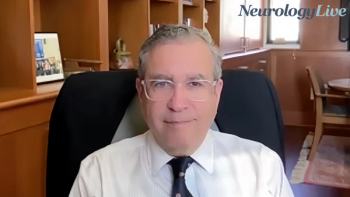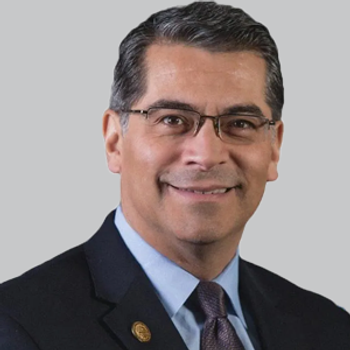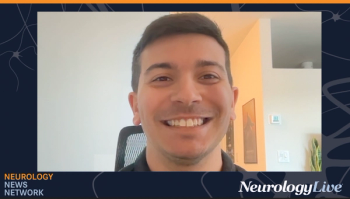
The submission was based on promising data from a phase 3 and phase 2 study, where treatment with apitegromab led to significant improvements in motor function among patients with SMA on SMN-targeted treatments.

The submission was based on promising data from a phase 3 and phase 2 study, where treatment with apitegromab led to significant improvements in motor function among patients with SMA on SMN-targeted treatments.

A duo of experts discussed the importance of addressing barriers such as provider comfort, access to genetic counselors, and insurance coverage to reduce diagnostic latency and standardize genetic testing for epilepsy. [WATCH TIME: 5 minutes]

The William S. and Lois Stiles Edgerly Professor of Neurology at Yale School of Medicine talked about refining multiple sclerosis in line with the updated diagnostic criteria. [WATCH TIME: 5 minutes]

The neurointensivist and assistant professor of neurology at Boston Medical Center gave insight on a 2024 paper establishing entrustable professional activities for neurocritical care advanced practice providers.

Early initiation of combined low‐dose rituximab therapy showed better improvements of chronic inflammatory demyelinating polyradiculoneuropathy in a short‐term than delayed initiation.

The U.S. HHS announced 15 drugs, including deutetrabenazine, will undergo Medicare Part D price negotiations to lower costs for seniors by 2027.

Neurologists Steven Lewis, MD, and Behrang Saminejad, MD, of Lehigh Valley Health Network, provided commentary on the ways to successfully implement focused ultrasound as a treatment for essential tremor and Parkinson disease.

Previously, Argenx's efgartigimod alfa and hyaluronidase-qvfc was granted orphan drug designation for the treatment of chronic inflammatory demyelinating polyneuropathy in Japan.

In the first such reported study, transcranial direct stimulation was shown to be superior over sham in improving pain intensity, headache frequency, and neck pain in patients with cervicogenic headaches.

Igor Rybinnik, MD, associate professor in the division of stroke and neurocritical care in the department of neurology at Rutgers Robert Wood Johnson Medical School, talked about aspects of dizziness.

Adjusted models confirmed a consistent negative correlation between serum vitamin D and migraine prevalence, with statistical significance (P < 0.05) across all analyses.

Crossover-treated patients demonstrated clinically meaningful and statistically significant improvements in functional outcomes despite being older at the time of treatment.

Kiranpal Singh Sangha, PharmD, clinical pharmacy specialist and adjunct assistant professor of pharmacy at The University of Cincinnati, talked about the vital role of clinical pharmacists in neurology, specifically in multiple sclerosis care.

Treatment with foralumab, an anti-CD3 monoclonal antibody, led to the discovery of several biomarkers known to be associated with antigen presentation, interferon responses, and other regulatory immune mechanisms.

The medical director of the Arkansas Children’s Comprehensive Epilepsy Program discussed the complications associated with neurostimulation in patients with LGS and strategies to mitigate these issues. [WATCH TIME: 2 minutes]

Here's some of what is coming soon to NeurologyLive® this week.

Once-monthly maintenance dosing with LEQEMBI offers convenience for patients and caregivers while slowing Alzheimer disease progression and prolonging therapy benefits after plaque clearance.

Pediatric epilepsy specialists Adam Numis, MD, and Laura Kirkpatrick, MD, highlighted efforts to standardize data collection for pediatric epilepsy health equity and improve neonatal epilepsy outcomes.

Recent findings from an analysis showed that sodium oxybate significantly reduced narcolepsy symptoms, including cataplexy and excessive daytime sleepiness, among patients with the sleep disorder.

Test your neurology knowledge with NeurologyLive®'s weekly quiz series, featuring questions on a variety of clinical and historical neurology topics. This week's topic is on neuromyelitis optica spectrum disorder.

Neurology News Network. for the week ending January 25, 2025. [WATCH TIME: 4 minutes]

OnabotulinumtoxinA injections are safe and well-tolerated in children and adolescents, with no patients reporting severe adverse events across all published studies and common adverse events predominantly comprising minor injection-site reactions.

Take 5 minutes to catch up on NeurologyLive®'s highlights from the week ending January 24, 2024.

The chief executive officer and cofounder of Amprion discussed the integration process of a novel a-synuclein seed amplification assay used to distinguish seeds from Lewy bodies and glilal cytoplasmic inclusions. [WATCH TIME: 2 minutes]

In a recent survey, key factors associated with perceived support included knowing someone who had the same diagnosis of their sleep disorder, younger age, and marital status.

Jessica Nickrand, PhD, and Allyson Eyermann from the Child Neurology Foundation emphasized the importance of multidisciplinary collaboration for children with epilepsy and their families.

Mind Moments®, a podcast from NeurologyLive®, brings you an exclusive interview with Depobam Samanta, MD, MS, FAAP, FAES. [LISTEN TIME: 25 minutes]

In the phase 2/3 DEVOTE study, a higher dose of nusinersen met its primary end point at 6 months, achieving a statistically significant improvement in motor function among treatment-naïve symptomatic infants with SMA.

The medical director of the Arkansas Children’s Comprehensive Epilepsy Program provided commentary on patient selection and personalized treatment approaches when using neuromodulation devices for Lennox-Gastaut syndrome. [WATCH TIME: 3 minutes]

Leah Blank, MD, an assistant professor of neurology, population health, science, and policy at the Icahn School of Medicine provided commentary on some of the experience and positive movement from the 2024 American Epilepsy Society Annual Meeting.